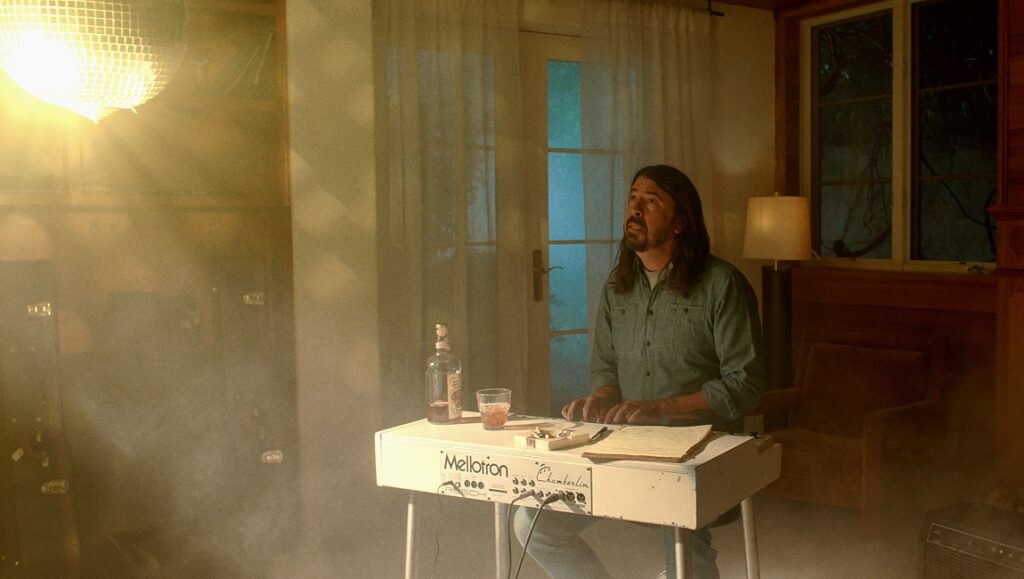Studio 666 is an obvious labor of love for Grohl and co., but one that delivers neither the necessary horror or comedy of its fan-service inspiration.
With Studio 666, post-grunge rockers Foo Fighters join a hallowed tradition of famous musicians making the transition to feature films, the likes of which include everyone from The Beatles to The Who to Tenacious D. But where many of these performers have gone a more experimental route in their road to Hollywood fame, frontman Dave Grohl and his merry band of Foos have opted instead for the road most travelled — namely, into horror territory, where expectations are lowered and results are varied. That certainly holds true for Studio 666, a film that may appeal to many a middle-aged fan, and very likely few others. It’s actually rather surprising that Grohl has avoided the Hollywood machine this long, as his effervescent charisma and easy likeability had proved a major factor in the Foo Fighters’ continued longevity. It’s sad to report, then, that not many of those qualities are on display in his feature film debut, which seems to exist solely because Grohl digs scary flicks, quality be damned. In what basically amounts to a modern-day riff on The Evil Dead, Grohl and co. head to a sprawling mansion in the Hollywood Hills to record their tenth album, seeking a dramatic change in the sound that has defined their career. What the Foos find instead is a haunted house plagued by demons that proceed to possess Grohl, inspiring him to write a never-ending song that will unleash hell on Earth if it’s ever completed. The result is all sorts of gory comedic mischief, as Grohl slowly loses his grip on reality, ultimately hunting down the members of his band and killing them in the most obscene ways possible.
Grohl himself gets a story credit on this film, which seems fair to assume was roughly, “I get possessed by a demon and murders my bandmates,” which screenwriters Jeff Buhler and Rebecca Hughes turn into a film so beholden to the aforementioned The Evil Dead that Sam Raimi could possibly sue for copyright infringement. And indeed, that’s the biggest problem with Studio 666: there’s not an ounce of originality to be found. There are a couple of clever ideas brewing beneath the surface, namely that once Grohl becomes possessed, he turns into a narcissistic asshole who treats his fellow band members like talentless hacks, the Diana Ross to their Supremes. It would be incredibly easy to exploit this aspect for maximum comedic effect, especially considering Grohl’s experience in the Kurt Cobain show that was Nirvana, yet Buhler and Hughes are so beholden to the horror films of yesteryear that they refuse to engage with those very elements that might prove original or noteworthy. Instead, we get Whitney Cummings, portraying a horny, nosy neighbor, giving a five-minute exposition dump about how a Book of the Dead made of human flesh will prove both the band’s undoing and their ultimate salvation. All of the band members are essentially playing heightened versions of the respective personas they have honed over the years, from guitarist Pat Smear being laidback and affable to pianist Rami Jaffe playing a sex-obsessed New Age hippie. And in this playfulness, there’s no denying the sense of camaraderie on display, but none of these guys are seasoned actors, and that inexperience is evident in nearly every scene.
Elsewhere, director B.J. McDonnell opts for a digital crispness that undercuts any sort of tension, making the proceedings look like a particularly violent TV movie. There are no scares here, nothing to pique the interest of even the most timid of horror watchers. On the flipside, the gore actually comes out more impressive than expected, a 70/30 mix of practical and digital that succeeds more than it fails. And a particularly special shout-out also has to be given to the film’s main theme, courtesy of Grohl and John Carpenter, a slice of synth heaven if ever there was one. Strangely, though, the Foo Fighters themselves have provided no original music for the film, which is a considerably surprising develpment — almost as much so as the movie’s obsession with Jaffe’s bulging, underwear-clad package. Studio 666 ultimately seems like a film tailor-made for the band’s core audience, namely middle-aged males who drop the F-bomb every other word and make hoary jokes about such varied topics as ranch dressing, grandma-fucking, and the television series NCIS. That this writer falls quarely within that target demographic and still found the proceedings to be incredibly underwhelming, not to mention entirely too long, says plenty about the film’s appeal. At a punishing 108 minutes, the film overstays its welcome by a good 30 minutes, and has more false endings than The Return of the King. Ultimately, Foo Fighters fans deserve more than Studio 666, a pandering piece of claptrap that is neither particularly scary nor all that funny. But at least the the obscene amount of Doritos product placement here likely has the band’s next tour paid for in full.


Comments are closed.